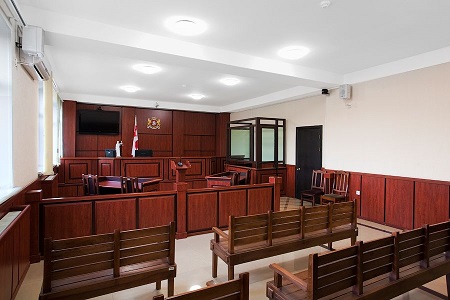OSCE's Human Right office advices Georgia to further strengthen independence of the judiciary

The OSCE Office for Democratic Institutions and Human Rights (ODIHR) is offering concrete recommendations to those in the criminal justice sector on the importance of fair trial rights and the independence of the judiciary and how both areas can be strengthened in law and practice.
The ODIHR released its Georgia Trial Monitoring Report project, following an invitation from the country’s authorities, which began in February 2013 and reviewed 14 criminal cases against senior officials of the previous government in Georgia.
ODIHR director Michael Link was confident that his team’s monitoring efforts, as illustrated in the report’s findings and recommendations, would contribute to the further consolidation of Georgia’s democratic institutions.
"Georgia is undergoing important reforms of its criminal justice system that will hopefully result in the improved protection of fair trial rights in court proceedings,” he said.
The trial monitoring project monitored 327 court hearings. The report provided analysis of compliance with selected fair trial rights, with a focus on identifying shortcomings in court practice and national legislation.
"Trial monitoring has proven to be a powerful tool for supporting judicial reforms and promoting domestic and international guarantees of fair trial rights in many OSCE participating ztates,” said Thomas Vennen, head of ODIHR’s Democratization Department.
"We stand ready to continue assisting the Georgian authorities in the implementation of the recommendations presented today in our Trial Monitoring Report.”
To ensure the right of citizens to a free and fair trial and to correct issues, the report offered three recommendations to the executive body of the Government, four recommendations for the Prosecutor’s office and 34 recommendations to the court system.
Recommendations to the Court
The report identified concerns related to a number of fair trial rights, including equality of arms between parties and the presumption of innocence. The report also noted shortcomings in legislation, such as issues related to trials in absentia and the need for improved rules of evidence.
Furthermore, ODIHR recommended the court to manage the processes within courtrooms, particularly the independence of the judges and improve other court processes and practices.
The report further highlighted that some advocates of former government officials did not have skills of professional standards which were necessary to ensuring the rights of the detainees.
"Consequently, the observed practices constituted violations to varying degrees, of the defendant’s right to a public hearing and thus limited the corresponding access by the public to these hearings,” the report concludes.
Recommendations for the executive body of the Government
In the list of recommendations issued to the executive body of the Government, ODIHR focused on inadmissibility of the politicisation of the Prosecutor's Office, to protect the presumption of innocence and conducting a transparent and consultative selection process of the Chief Prosecutor.
"When commenting on judicial processes, and particularly on ongoing criminal investigations, public officials should carefully balance their statements to avoid politicising the judiciary or the Office of the Chief Prosecutor,” the report said.
It also underlined that public officials should respect the presumption of innocence when commenting on potential or ongoing criminal proceedings.
ODIHR also recommended Parliament to continue legislative reforms, some of which have already been developed by the Ministry of Justice.
Recommendations for the Chief Prosecutor’s Office
The Chief Prosecutor should consider issuing standard guidance to prosecutors to ensure that indictments are not included or treated as evidence, the ODIHR said.
It also believed the prosecution should refrain from calling the defendant to testify as a witness for the prosecution, and the Chief Prosecutor should consider issuing standard guidelines or instructions to that effect.
"Prosecutors should refrain from considering witnesses’ consent as a necessary requirement for the parties to read and refer to out-of-court statements of witnesses during the trial,” the report read.
Furthermore ODIHR recommended that prosecutors should conduct themselves in such a manner that ensured that witnesses and victims were examined in a way that did not violate their basic right to be treated with humanity, dignity, and respect.
 Tweet
Tweet  Share
Share